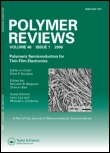
Polymer Reviews
Scope & Guideline
Advancing the frontiers of polymer science.
Introduction
Aims and Scopes
- Biomaterials and Medical Applications:
The journal frequently publishes reviews on polymers used in medical applications, including drug delivery systems, tissue engineering, and biomaterials like collagen and polysaccharide composites. - Polymer Composites and Nanocomposites:
A significant focus is placed on the development and application of polymer composites, particularly those enhanced with nanomaterials for improved mechanical, thermal, and electrical properties. - Sustainable and Green Polymers:
There is a consistent emphasis on eco-friendly and sustainable practices in polymer synthesis and application, including biodegradable polymers and renewable resources. - Advanced Polymer Processing Techniques:
The journal covers innovative processing methods, such as 3D printing and electrospinning, that enable the creation of advanced polymer structures and composites. - Functional Polymers and Smart Materials:
Research on polymers with specialized functions, such as stimuli-responsive materials, conductive polymers, and those with self-healing properties, is a key area of exploration. - Polymer Characterization and Modeling:
The journal also delves into the analytical methods for characterizing polymers and modeling their properties and behaviors, essential for both research and industrial applications.
Trending and Emerging
- Nanotechnology in Polymers:
There is a notable rise in research focusing on nanocomposite materials and their applications in various fields, including electronics and energy storage, highlighting the importance of nanotechnology in enhancing polymer properties. - Self-Healing and Reversible Polymers:
The exploration of self-healing and reversible crosslinking technologies in elastomers and other polymers is gaining momentum, showcasing potential for applications in sustainable and durable materials. - Biopolymers and Green Chemistry:
The trend towards biopolymers derived from renewable resources is notable, alongside research into green synthesis methods, aligning with global sustainability goals. - Smart and Responsive Polymers:
An increase in interest in stimuli-responsive polymers, including those used for drug delivery and sensors, reflects the growing demand for smart materials that can adapt to environmental changes. - Advanced Characterization Techniques:
The incorporation of cutting-edge characterization methods, such as advanced spectroscopic and imaging techniques, is becoming a prominent theme, aiding in the understanding of polymer structures at the molecular level.
Declining or Waning
- Traditional Thermosetting Polymers:
There seems to be a decline in interest in conventional thermosetting polymers, with fewer reviews focusing on their applications and properties compared to emerging materials and technologies. - Basic Polymer Chemistry:
The foundational aspects of polymer chemistry, such as basic polymerization techniques, appear to be waning as the focus shifts towards more applied research and innovative materials. - Conventional Plastic Recycling Techniques:
Discussions surrounding traditional recycling methods for standard plastics are decreasing, possibly due to a greater emphasis on novel biodegradable materials and eco-friendly practices.
Similar Journals
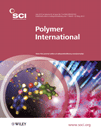
POLYMER INTERNATIONAL
Driving Excellence in Polymer ResearchPOLYMER INTERNATIONAL is a leading journal in the field of polymer science, published by Wiley, one of the most esteemed scholarly publishers. With an ISSN of 0959-8103 and an E-ISSN of 1097-0126, this journal has been a pivotal platform for researchers since its inception in 1991, now extending its coverage until 2024. The journal boasts a commendable standing in various scientific domains, achieving a Q2 quartile ranking in Materials Chemistry, Organic Chemistry, and Polymers and Plastics as of 2023. Additionally, it holds impressive Scopus ranks, including Rank #47 in Organic Chemistry and Rank #40 in Polymers and Plastics, placing it within the top percentiles of its categories. Researchers, professionals, and students alike can benefit from its rich array of articles that contribute to the understanding and advancement of polymer technology and materials science. Although not an open access journal, POLYMER INTERNATIONAL remains crucial for disseminating high-quality research that drives innovation and development within the field.

Express Polymer Letters
Exploring the Frontiers of Polymer KnowledgeExpress Polymer Letters is a leading open-access journal published by BUDAPEST UNIVERSITY OF TECHNOLOGY AND ECONOMICS, focusing on the fast-paced realm of polymer science and engineering. With a broad scope that encompasses the interdisciplinary fields of Chemical Engineering, Materials Chemistry, and Organic Chemistry, the journal serves as a crucial platform for researchers and professionals dedicated to advancing knowledge and innovation in polymer-related disciplines. Since its inception in 2007, it has consistently provided high-quality, peer-reviewed research and has achieved a respectable impact within various categories, evidenced by its Q2 quartile rankings across multiple Scopus categories and its competitive standings in the field. The journal's dedication to open access ensures that research is widely disseminated, promoting transparency and collaboration within the academic community. Positioned to converge into the future, Express Polymer Letters remains an essential resource for cutting-edge studies and developments, with an anticipated convergence period extending through 2024.
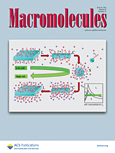
MACROMOLECULES
Unveiling the Secrets of MacromoleculesMACROMOLECULES, published by the American Chemical Society, is a premier journal in the fields of inorganic chemistry, materials chemistry, organic chemistry, and polymers and plastics. Since its inception in 1968, this influential journal has established itself as a vital resource for researchers, professionals, and students, showcasing cutting-edge research and advancements in the study of macromolecules and high-performance polymers. With a distinguished impact factor and consistently ranking in the top quartiles (Q1) across its relevant categories, MACROMOLECULES is recognized for its high-quality publications that contribute significantly to the scientific community. The journal is accessible in both print and electronic formats, facilitating rapid dissemination of knowledge. By providing a platform for innovative studies and groundbreaking discoveries, MACROMOLECULES continues to play a crucial role in shaping the future of materials science and polymer research.

IRANIAN POLYMER JOURNAL
Connecting Scholars in Chemical Engineering and PolymersWelcome to the Iranian Polymer Journal, an esteemed publication encompassing a rich history since its inception in 1996 and extending its scholarly reach up to 2024. Published by Springer from Switzerland, this journal stands out in the fields of Chemical Engineering, Materials Chemistry, and Polymers and Plastics, proudly holding a Q2 category ranking in each of these disciplines for 2023. With an ISSN of 1026-1265 and an E-ISSN of 1735-5265, the journal serves as a vital resource for researchers, professionals, and students, offering insights into polymer science and interdisciplinary applications. Although not an open-access journal, it presents an invaluable platform for high-quality research dissemination and robust peer-reviewed articles. With Scopus rankings indicating its respected position within the academic community, the Iranian Polymer Journal is committed to advancing knowledge and fostering innovation in polymer-related studies, making it an essential addition to your research library.
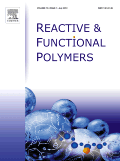
REACTIVE & FUNCTIONAL POLYMERS
Exploring the Frontiers of Reactive and Functional PolymersREACTIVE & FUNCTIONAL POLYMERS, published by Elsevier, is a leading journal in the field of polymer science, focusing on the innovative development and application of reactive and functional polymers. With an impressive impact demonstrated through its classification in various prestigious categories, including Q1 rankings in Chemical Engineering, Chemistry, and Materials Chemistry, this journal serves as an essential resource for researchers and professionals seeking to explore the latest advances in polymer research. With a broad scope that encompasses topics from biochemistry to environmental chemistry, and a convergence of significant findings from 1995 to 2024, REACTIVE & FUNCTIONAL POLYMERS fosters academic dialogue and collaboration among scientists. The journal also features Open Access options, ensuring that groundbreaking research is readily available to a global audience. By consistently publishing high-quality articles, it not only enriches the scientific community but also drives innovation across various industries reliant on polymer technologies.

ADVANCES IN POLYMER TECHNOLOGY
Pioneering Tomorrow's Polymers Today.ADVANCES IN POLYMER TECHNOLOGY is a premier open-access journal that has been at the forefront of innovation in the field of polymer science and engineering since its inception in 1981. Published by WILEY-HINDAWI, this journal serves as a vital platform for researchers, professionals, and students alike, facilitating the dissemination of cutting-edge research and applications in chemical engineering, organic chemistry, and polymers and plastics. With an impact factor that signifies its relevance and quality, the journal has achieved notable rankings, including Q2 in Chemical Engineering, and ranks within the top 30% of its category in multiple disciplines as of 2023. ADVANCES IN POLYMER TECHNOLOGY has embraced open-access publishing since 2019, ensuring that research findings are widely available to the global academic community. With its comprehensive coverage of topics related to polymer technology, this journal not only fosters scholarly exchange but also aims to bridge the gap between fundamental research and practical applications, thereby contributing significantly to advancements in materials science.

POLYMER SCIENCE SERIES A
Exploring Innovations in Materials ChemistryPOLYMER SCIENCE SERIES A is a distinguished journal dedicated to the field of polymer science, with a focus on advancing knowledge in materials chemistry and polymers and plastics. Published by MAIK NAUKA/INTERPERIODICA/SPRINGER, this journal provides a platform for researchers and practitioners to disseminate their findings and innovations. With an ISSN of 0965-545X and an E-ISSN of 1555-6107, it is widely accessible to the academic community. Although currently non-open access, the journal has maintained its significance since its inception in 1991, boasting an evolving emphasis on contemporary issues in polymer science up to 2024. Ranked in the Q3 category for both Materials Chemistry and Polymers and Plastics in 2023, POLYMER SCIENCE SERIES A plays a crucial role in the broader academic landscape, particularly for those committed to understanding and enhancing polymer materials. The journal’s reputation is solidified by its Scopus rankings, where it addresses critical advancements and fosters collaborative research opportunities within the community. We invite researchers, professionals, and students to explore the valuable insights published within these pages.

MACROMOLECULAR RESEARCH
Catalyzing Progress in Polymer ScienceMACROMOLECULAR RESEARCH, published by the POLYMER SOC KOREA, is a premier journal dedicated to advancing the field of macromolecular science and polymer engineering. With its ISSN 1598-5032 and E-ISSN 2092-7673, this journal has emerged as a vital platform for researchers and professionals interested in the application and development of polymers across various domains. Based in South Korea and operating as an open-access resource since its inception in 2002, MACROMOLECULAR RESEARCH consistently ranks in the Q2 category across diverse fields such as Chemical Engineering, Materials Chemistry, and Organic Chemistry as per the latest 2023 metrics. Notably, it is recognized for its substantial contributions to polymery science, increasing its visibility and impact in global research. By providing a forum for original research articles, reviews, and innovative methodologies, this journal aims to foster collaboration and knowledge sharing among scientists, engineers, and students alike. Join a community that is at the forefront of polymer research by exploring the wealth of resources and cutting-edge studies featured in MACROMOLECULAR RESEARCH.
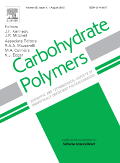
Carbohydrate Polymers
Innovating materials through carbohydrate science.Carbohydrate Polymers is a prestigious academic journal, published by ELSEVIER SCI LTD, that plays a vital role in the field of materials chemistry, organic chemistry, and polymer science. With its Q1 category rankings in these domains, this journal serves as a critical platform for disseminating high-quality research, innovative methodologies, and significant advancements in carbohydrate-based polymers. Since its inception in 1981 and continuing until 2025, it has fostered critical discussions and collaborations among researchers, professionals, and students worldwide. Although it does not offer open access, its rigorous peer-review process ensures that only the most impactful studies are published. By highlighting new developments in the synthesis, characterization, and application of carbohydrate polymers, Carbohydrate Polymers consistently contributes to the enhancement of knowledge and technology within its field, making it an essential resource for anyone working at the intersection of chemistry and materials science.
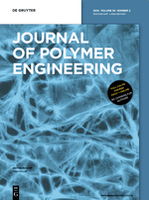
JOURNAL OF POLYMER ENGINEERING
Driving Technological Breakthroughs in Polymers.JOURNAL OF POLYMER ENGINEERING, published by Walter de Gruyter GmbH, stands as a pivotal platform in the field of polymer science and engineering. With an ISSN of 0334-6447 and an E-ISSN of 2191-0340, this journal has been a vital contributor to the academic landscape since its inception, spanning publications from 1981 to 2024. As a recognized entity in the realms of Chemical Engineering, Materials Chemistry, and Polymers and Plastics, it holds a respectable position in Q3 quartile rankings according to the latest assessments. The journal is positioned to promote the exchange of cutting-edge research findings, technological advancements, and critical reviews that address the complexities of polymer application and innovation. Researchers and professionals will find a wealth of information, from experimental methodologies to theoretical analyses, all designed to inspire and elevate the current understanding of polymer engineering. By fostering collaboration and dissemination of knowledge, the JOURNAL OF POLYMER ENGINEERING remains crucial for advancing research and education in its specialized domains.